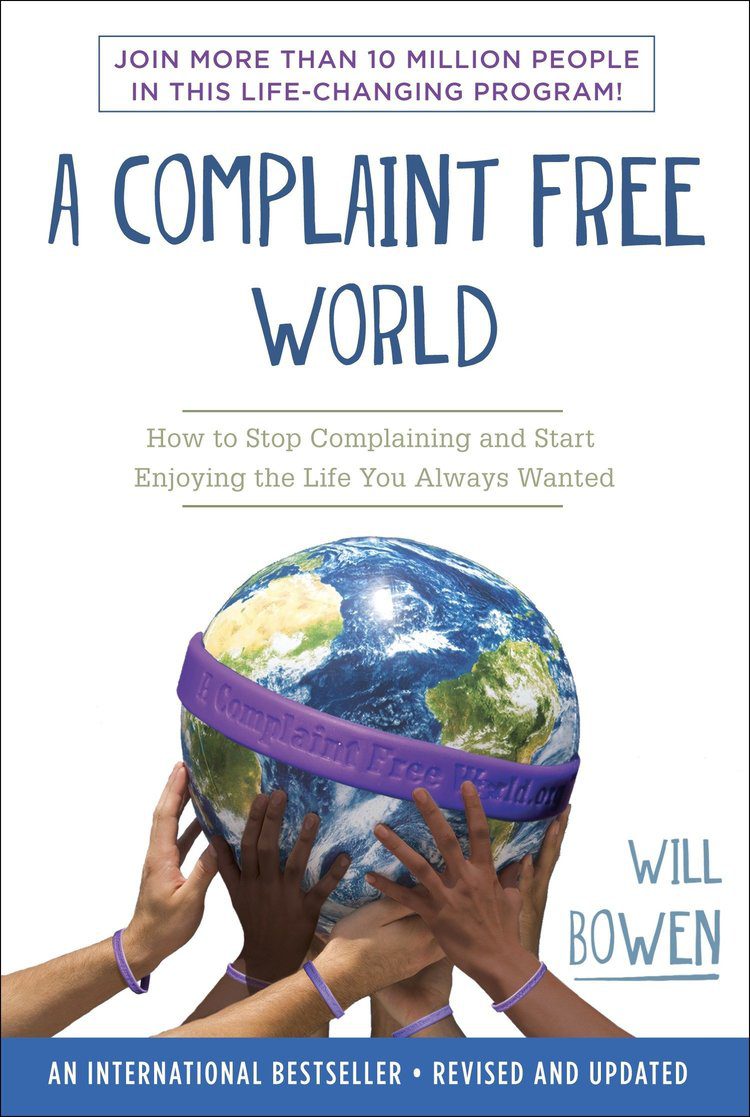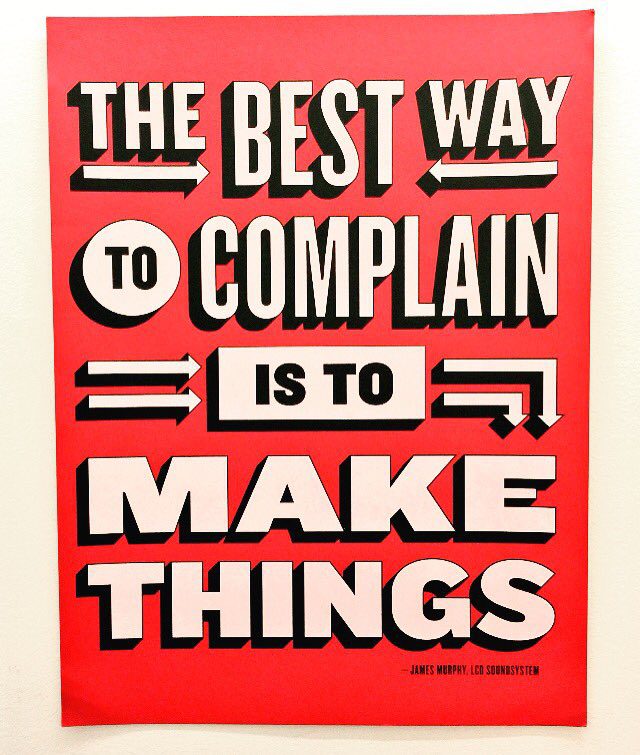American poet Maya Angelou once remarked: “If you don’t like something, change it. If you can’t change it, change your attitude. Don’t complain.” We all complain, and we complain more than we think. When we complain, we believe it is justified, but when others do complain, we can see it clearly, and we often tell them to stop nagging. Founder of the Complaint Free movement and the author of A Complaint Free World, Will Bowen, observed, “Complaining is like bad breath. We notice it when it comes out of someone else’s mouth, but not when it comes out of our own.” Sometimes, we complain to make sense of the situation; it can be therapeutic or cathartic. Complain if you have to, but do something about what you are complaining about. If it is something within your locus of control, do something about what you are complaining about and it is not within your locus of control, like the weather, consider it a fact of life. The Best Way to Complain is to Make Things.
“Appreciate life. Never complain. Work hard and do your best.”
Whatever will go wrong will eventually go wrong (Murphy’s Law). When things go wrong like they ultimately do, the easiest thing to do is to complain, nag and moan about the situation. Knowing the difference between a fact of life (changing seasons) and life situation is critical in navigating the roller coaster called life. No one has a problem-free life; if it is not this, then it is that. Nothing lasts forever,s and everything is in transition, the key is to understand the season of life you are in and understand the lesson every situation is trying to teach you.

In A Complaint Free World: How to Stop Complaining and Start Enjoying the Life You Always 1, author Will Bowen writes about the pervasiveness of complaining in our lives, the reason we complain and strategies to reducing our complaining habit. He writes
When most people are unhappy with their boss, they complain to their spouse. When they are displeased with their spouse, they complain to their friends. They speak to anyone and everyone except the person who can actually improve the situation, and they live in disappointment and bewilderment, wondering why their relationships don’t improve.
Complaining vs Statements of Fact
- A statement of fact is a neutral comment intended to inform (not berate) the listener.
- Complaints are counterattacks for perceived injustices. A statement of fact is a neutral comment intended to inform (not berate) the listener.
A complaint is distinguished from a statement of fact by the energy expressed.:
- Statement of Fact: It’s hot today
- Complaints: A heavy sigh followed by the lament “It’s hot today”
Characteristics of a complaint
- There is negative energy being expressed with a complaint
- Most complaints have a “This is unfair!” or “How dare this happen to me” quality.
- Complaints are counterattacks for perceived injustices.
Why We Complain
People complain to Get attention, Remove responsibility from themselves, Inspire envy, have Power over others, and Excuse poor performance.
Man invented language to satisfy his deep need to complain.—LILY TOMLIN
Mnemonic on Complaining (G.R.I.P.E)
- Get attention
- Remove responsibility
- Inspire envy
- Power
- Excuse poor performance
If you complain about a situation, you may be able to draw others to you, but “you won’t be able to get much done, because your focus is on the problem and not the solution. Discern what needs to be done and then begin to speak in terms of what it will be like when the challenge no longer exists, when the gap is bridged, when the problem is solve.
“Complaining may benefit us in many ways, such as gaining sympathy and attention—it may even gain us a radio audience—but being happy is not a benefit derived from complaining.”

You can’t complain2 and get ahead at the same time. Moaning about your troubles and moving in the right direction rarely happen together. The way you deal with difficulties and avoid feeling sorry for yourself can be as unique as you are.
Controlling what you can and not wasting energy on what you can’t is one of the most important lessons we can learn in life. Emotionally strong people don’t waste their energy when they are stuck in bad traffic, lose their luggage, or get caught in a storm. They recognize that all of these factors are beyond their control. Instead, they focus on what they can control.
Take responsibility for the things you can control:
• Attitude—you determine how you think or feel.
• Time—you determine how you spend time and who you spend it with.
• Priorities—you determine what is important in your life and how much time you give to these essentials.
• Passion—you identify what you love and what you were created to do.
• Potential—you determine where you commit yourself to grow.
You can’t complain and get ahead at the same time. Moaning about your troubles and moving in the right direction rarely happen together.

In his very inspiring book, Be Useful: Seven Tools for Life 3, American actor, former politician, and former professional bodybuilder Arnold Schwarzenegger advised “Complain if you have to but do something about it.” He writes
I have a rule: no complaining about a situation unless you’re prepared to do something to make it better. If you see a problem and you don’t come to the table with a potential solution, I don’t want to hear your whining about how bad it is. It couldn’t be that bad if it hasn’t motivated you to try to fix it.
You work is to make a dream come true, you don’t whine it into existence. Plus, problems and adversity are a normal part of every person’s journey. Whatever your vision is, there is going to be struggle. Tough times. Things that bug the shit out of you. You have to learn how to manage those moments. You have to get good at shifting gears and finding the positive in things. You have to know how to reframe the failure you experience and understand the risks you’re undertaking. Confronting problems instead of complaining about them gives you the chance to practice all these skills.
Never Explain, Never Complain. Those that need it don’t matter, Those that matter don’t need it.
Meditations
- Daily Calm with Tamara Levitt – What is this?
- In the subjective experience of our mind, we are always searching for answers. We find comfort in the certainty of knowledge and difficulty in the uncertainty of questioning. The unknown is uncomfortable, when we stay in a state of enquiry; it helps us get comfortable with just asking the question.
- Staying with enquiry opens our minds to new perspectives and ideas; it allows us to move into possibility and wander the way a child moves in the moment marvelling at the unknown universe around her.
“The important thing is not to stop questioning. Curiosity has its own reason for existing. One cannot help but be in awe when he contemplates the mysteries of eternity, of life, of the marvelous structure of reality. It is enough if one tries merely to comprehend a little of this mystery every day.” – Albert Einstein
- Daily Jay with Jay Shetty – New Routines
- You don’t want to be so attached to a routine that it becomes a rot. Yet, routines can ground us as we navigate the uncertainty of our world, they can be an antidote when we get overwhelmed by plans, worries or decisions. It can be the key to forming habits and accomplishing goals.
- In times of change, it is easy to be self-critical or self-doubting; that is when you need to lean into self-compassion—acknowledging what is challenging and supporting yourself with kindness.
MAY I be gentle with myself in this moment.
Podcast
- Do THIS to ATTRACT your DREAM LIFE (Your IDENTITY & Fears Are LYING TO YOU!) | Rob Dial
All the best in your quest to get better. Don’t Settle: Live with Passion.



Comments are closed.